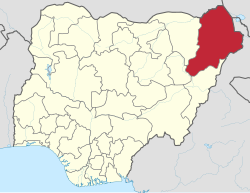| 2019 Konduga bombings | |
|---|---|
| Part of the Boko Haram insurgency | |
 | |
| Location | Konduga, Borno, Nigeria |
| Date | 16 June 2019 |
| Target | Football fans |
Attack type | Suicide bombings |
| Weapons | Suicide vest |
| Deaths | 30 (+3 attackers) |
| Injured | 40+ |
On the evening of 16 June 2019, three suicide bombers detonated their explosives in Konduga village in Borno State, Nigeria, killing 30 people and wounding over 40. [1] [2] The first bomber targeted football fans who were watching a game on television in the hall. [3] He was blocked from entering the hall by the owner. A heated argument ensued, during which the bomber detonated his explosives. This attack was the most deadly suicide bombing in 2019 in Nigeria. [4] Soon after, the other two - both of whom were female [2] - blew themselves up nearby. [1]
Konduga had suffered previous attacks, including massacres in January 2014 and in February 2014, a triple suicide bombing in February 2018 and a suicide bombing at a mosque in July 2018. [3]
On 27 July 2019, a group returning from a funeral in Nganzai, Borno State, were the victims of a mass shooting. At least 65 people were killed. There was no claim of responsibility, but Islamist group Boko Haram often carries out massacres, most often in Borno. [5]